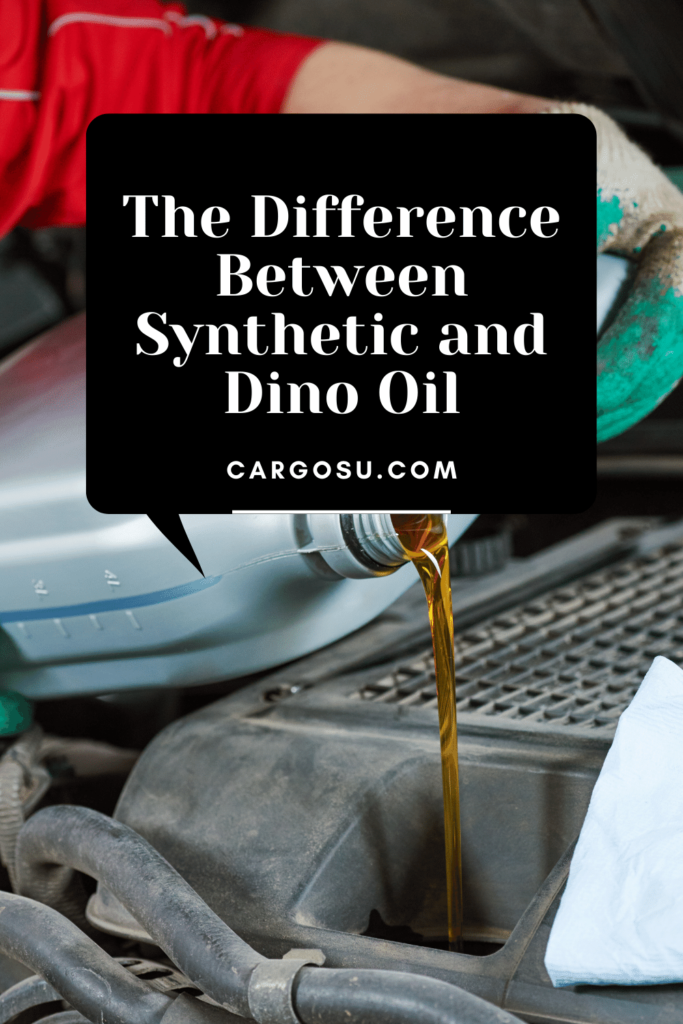Synthetic oils are manufactured in a laboratory from artificially created chemicals, while Dino oils are organic oils that occur naturally.
Despite synthetic oils’ “man-made” claims, they are all manufactured using distilled crude oil.
The additives in synthetic oils and the actual process of making the oil is a highly-guarded trade secret.
Table of Contents
The Difference Between Synthetic and Dino Oil
The main difference between synthetic and dino oil is the environment in which the oil is made. The fact that synthetic oil is artificially manufactured is the main selling point over organic oil. The oil that is manufactured is made in a controlled environment to lessen the number of impurities as well as to make it a more consistent product.

Dino Oil
The quality of Dino oil (organic oil) is influenced by the environment from which it was extracted as well as its manufacturing process.
You can also think of synthetic oil as a complimentary oil. It starts from nothing, components are then added until the finished product is eventually synthesized.
On the other hand, organic, or “Dino” oil is a simplified process. The oil starts its life as an unrefined product. It is then filtered to rid the oil of any impurities. Once the purification process is completed, whatever is left constitutes the final base product.
Most people generally consider synthetic oil as superior when deciding which oil is better, conventional, or synthetic oil.
This is because synthetic oil is manufactured in a lab to ensure the oil remains fluid at low temperatures and stable at high temperatures.
Therefore, synthetic oil has a longer service life in comparison to conventional engine oil.
What Oil Type is Best for your Vehicle?
Full Synthetic Motor Oil
Synthetic oils perform better as their formula provides them with properties that allow them to alter their viscosity from a low to a high operating temperature.
At a low temperature, the oil is less viscous, while at higher temperatures the oils become more viscous.
This is in contrast to conventional oils that do not have the same ability to impact wear and tear on an engine across the temperature spectrum.
The synthetic oils are generally made with higher-performing additives and are recommended for an engine that has a more complex, high-performance design.
Modern manufacturers require this oil for their vehicles because the designs of their cars have become much more complicated over time.
If you want to have a longer period between oil changes, then synthetic oil performs much better than conventional oil.
Conventional Motor Oil
Conventional oil is the most popular oil for motor vehicles. It is best suited for engines of a simple design, low to average mileage, and regular driving habits. However, it requires frequent changes whereas synthetic oil does not.
The upside to conventional oil is that, despite the more frequent oil changes, it is relatively cheap.
The more mileage your vehicle builds up, the more pressing it becomes to change over to synthetic oil, as this type of oil performs a lot better with engines that have greater wear.
However, you might have to change the synthetic oil more often at first to remove the sludge and other contaminants that the oil picks up.
Synthetic Blend Motor Oil
Conventional or “Dino” oil mixed with synthetic additives is considered the middle ground between fully synthetic and basic petroleum-based lubricants.
The mixture is a combination of both types of oils. This makes it a great option for drivers who want to change over from conventional to synthetic oil without the extra cost implications.
Some drivers will also use conventional oil mixed in with synthetic oil for the added performance and protection of synthetic oil but at a lower price point.
This is not a practice that is recommended as the performance of this type of combination of oils has not been fully tested.
How is Synthetic Oil made?
Generally, synthetic oils are made from chemically modified materials like petroleum components. However, most of the time, the material base is distilled crude oil.
The actual process of creating synthetic oil will vary among producers because it is considered a “trade secret.”
How is Dino Oil made?
There is a popular misconception that Dino oil, gas, or coal comes from the fossils of dinosaurs. This, however, is far from true.
Fossil fuels mainly consist of dead plants. Coal is created from ancient trees, and natural gas, as well as natural oil, are derived from algae, which is a type of water plant.
Therefore, your car does not burn dinosaur fossils, but merely dead algae and other plant matter.
Advantages of Synthetic Oil Over Conventional Oil
From the complicated processes of making synthetic oils, manufacturers can achieve the exact molecular qualities needed for specific applications.
The processes that are used to make synthetic oils allow oil companies to remove any impurities that are found in the distilled crude oil. From this, the oil molecules are tailored to meet the specific needs or demands of modern-day engines.
Due to this level of customization, synthetic oils can provide superior levels of protection and engine performance compared to conventional oils.
Here are a few of the advantages synthetic oils have over Dino oils:
- Greater engine protection
A car’s engine parts move at high speeds and are constantly in contact with one another.
When pushed to the extreme, these parts wear down, producing high temperatures.
Motor oil provides a thin layer of protection between these moving parts.
But, conventional oils lose their viscosity over time, whereas fully synthetic oils will not break down but rather protect your engine for a longer period.
- Cleaner engine
Deposits form when motor oil circulates through your vehicle’s engine.
When using conventional oil, over time, a certain amount of sludge will form which reduces the efficiency and lifespan of your engine.
Synthetic oils, however, contain fewer impurities and resist the formation of sludge.
The additional properties inherent in the synthetic oil help to clean out the engine, resulting in fewer particles that may damage the moving parts.
- Better viscosity
Whether it be high or low temperatures, synthetic oils’ viscosity remains stable compared to conventional oil or synthetic blends.
Fully synthetic oils are designed to flow at a steady pace in cold conditions and resist extreme heat. This allows your vehicle’s engine to run smoothly, no matter the temperature.
- Turbocharger protection
Nowadays, more cars are built with smaller engines and turbochargers.
Synthetic oils will flow a lot faster in critical parts which creates the correct lubrication your engine requires.
In comparison, conventional oils break down a lot faster under turbocharger conditions due to increased heat.
By using a fully synthetic option, you will keep your turbocharged vehicle operating at its peak performance for longer.
Frequently Asked Questions About Synthetic and Dino Oil
Which is better, synthetic oil or conventional oil?
Synthetic oil is better for your engine than conventional oil. While conventional oils lubricate adequately, they are unable to compete with the overall engine performance and protection that synthetic oils provide.
When should synthetic oil not be used?
Previously, synthetic oils contained additives that could harm older engines. However, this is no longer the case and synthetic oils are safe to use on older or even classic cars, without the fear of it damaging the engine. The oil is rated to last between 10,000 to 15,000 miles or roughly, six months to a year.
Why can you not go back to conventional or “Dino” oil after switching to synthetic?
This is a myth. Many say that once you have switched to synthetic oil, you can never go back. However, this is not true. You can chop and change between these types of oils at any time. Additionally, synthetic blends are merely a mixture of synthetic and conventional oils.
Conclusion on The Difference Between Synthetic and Dino Oil
In conclusion, the main difference between synthetic and Dino oil is that they are made in different environments. Where synthetic oil is engineered in a lab, Dino oil is a product of nature.
Both are equally as efficient. However, synthetic oil is recommended over conventional oil because it lasts longer and is better at keeping your vehicle’s engine running at peak performance.

